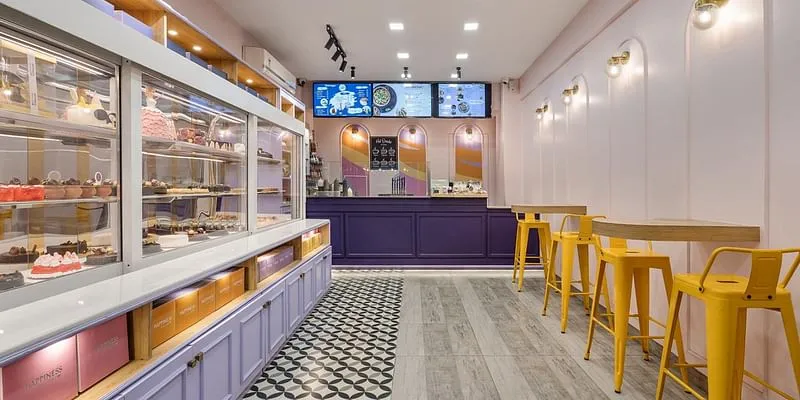From earning Rs 700 a month, this entrepreneur went on to launch 43 pancake stores across India
Desserts like cakes, pastries, doughnuts, waffles, etc, may have a new competition - flavoured pancakes! And Mumbai-based brand 99 Pancakes, founded by Vikesh Shah, proved that India is ready to explore this relatively new entrant in the market.
At 18, when Vikesh Shah started working at a small cake shop in Mumbai just to earn some extra bucks, never did he imagine that his experience would lead to something big.
He worked hard at the store, earning Rs 700 a month, and rising to the ranks of a manager in just two years. Soon after, he quit, and started his own corporate catering venture and another food-related business.
In 2007, he started his first physical store, a bakery called The Happiness Deli in Mumbai, so that his desserts could reach a wider audience.
A keen observer of trends and cultures, Vikesh had noticed during his travels to Europe that pancakes, with its various toppings and flavours, were a staple, and consumed mainly as a breakfast meal. With the increasing popularity of pastries and English desserts in India, he felt like there was a huge market lying untapped for pancakes.
“I was confident that introducing pancakes as a dessert in India will work because 20 years in the industry had given me enough knowledge about the taste buds of the Indian subcontinent, and more insights into the market,” he says.
This is how the idea to start a pancake quick service restaurant (QSR) chain in India germinated.
Capturing the mass market
Vikesh says he knew that unlike in the west, India will not take to pancakes for breakfast, atleast as a staple. “People are more than happy with idlis and vada paos.” So, he decided to “Indianise” the product. And according to him, achieving this was very simple as all he had to do was add Nutella or chocolate to the pancakes.
“No matter how much Indians talk about organic foods, diets, etc, everyone has a cheat day wherein they want chocolate, ice cream or something buttery and spicy. The Indian taste buds revolve around these three to four aspects,” he notes.
Vikesh launched the first outlet of his pancake specialty store in Mumbai’s Kala Ghoda in 2017. It started selling pancakes for Rs 99, thus the name - .
“I am not a marketing person at all. Infact, when we started out, we did not even have a Facebook page,” says Vikesh. By the end of the first year, it managed to scale up to three outlets.
When asked if having a production-led strategy helped in this kind of scaling, he says the company’s focus was on “the drama around making these specialty pancakes” and “capturing the younger generation.” The QSR chains have big, open kitchens where customers get to see how their pancakes are freshly made and served to them.
The company peaked in 2018 and 2019 when it launched 65 stores pan India including Gujarat, Telangana, Madhya Pradesh, Karnataka and Tamil Nadu. Today, it is also present on delivery aggregators such as Zomato and Swiggy.

Learning from mistakes
While 99 Pancakes witnessed decent highs in its four-year journey, Vikesh admits the graph did not always consistently move upward. He is candid when he talks about mistakes they made as a brand, and the challenges they confronted.
Being heavily dependent on the franchise model is one thing they got wrong, he says. In order to grow in the initial years, the company gave several outlets, one after another, to franchisee owners.
“Onboarding someone to take ownership in the franchisee model seems very easy, they pretend to care about your vision and follow all standard operating procedures (SOPs),” Vikesh says. However, Vikesh realised later that several owners were offering items that were not on the menu and were compromising on quality and processes.
Vikesh says he also realised the business they were missing out on by not having outlets in key locations.
However, the entrepreneur has since learnt his lessons, and bounced back wiser and more determined.
“Earlier it was all about chasing numbers but now we have become mature and want to follow a more slow-and-steady approach.” He adds that having a good location ensures an equally decent footfall.
The brand also had to downsize because of the COVID-19 pandemic. From over 65 outlets in pre-pandemic times, it is down to 43 presently. Moreover, even though it reported sales worth Rs 16.5 crore in FY20, it went down to Rs 7 crore in FY21.
Sticking to the core
For doughnut brands like Mad Over Donuts and Dunkin Donuts, diversification has been one of the key business strategies. Though their core was a very niche product, they decided to expand their basket to keep the business going. The players introduced other varieties like shakes and burgers.
99 Pancakes also decided to experiment by introducing other varieties in its menu including waffles, shakes, crepes, cakes, pizzas, shakes, and more. But Vikesh is very clear that they will not deviate from their core despite rolling out other categories.
“Initially, we were against introducing other items like waffles in our menu but then realised that to keep the customer’s interest, we have to expand our menu,” he reasons.
So, from pancakes, the company went on to introduce waffles and even pizzas. He says he wanted to cater to something beyond just desserts, and also increase bill size.
The company continues to stick to its core product - pancakes - by coming up with different flavours or toppings every quarter.
Currently, also on offer are maple syrups, jellies, red velvet and more as flavours or toppings on pancakes.
Future plans
In the next 12-18 months, Vikesh wants to raise funds, invest in marketing, and roll out about 25 more outlets to reach the pre-pandemic levels.
Additionally, selling their own pancake mixes is also in the pipeline. Due to its niche area, 99 Pancakes does not have any direct competition in the Indian market yet, however several international brands like Betty Crocker, Slurrp Farm, True Elements and a few others already have a place in the market.
“Right now, we are only catering to the younger generation, but I want to expand to other demographics too. Modern trade is competitive but has enormous potential in terms of returns - if done right!" he quips, before signing off.
Edited by Anju Narayanan









